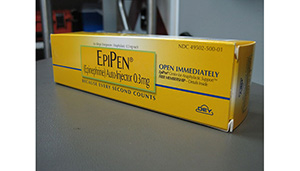 Sanofi (NYSE:SNY) reportedly sued Mylan (NSDQ:MYL) today, accusing the company of illegally suppressing competition to the EpiPen device. The lawsuit filed in a New Jersey federal court alleges that Mylan’s conduct has cost Sanofi hundreds of millions of dollars in sales for its rival allergy treatment, Auvi-Q.
Sanofi (NYSE:SNY) reportedly sued Mylan (NSDQ:MYL) today, accusing the company of illegally suppressing competition to the EpiPen device. The lawsuit filed in a New Jersey federal court alleges that Mylan’s conduct has cost Sanofi hundreds of millions of dollars in sales for its rival allergy treatment, Auvi-Q.
Canonsburg, Penn.-based Mylan has found itself at the center of the pharmaceutical industry’s pricing problem over the past year. In August, reports revealed that the company has hiked the price of its device more than 500% since it acquired the EpiPen from Merck (NYSE:MRK) in 2007. Since then, CEO Heather Bresch has endured questioning by lawmakers and the company has been probed by the Federal Trade Commission.
Bresch defended EpiPen’s pricetag at a hearing before the Senate, saying that the company has improved the device over the years.
Also today, newly reported court documents show that Mylan took West Virginia to court after the state moved to encourage doctors to prescribe cheaper alternative devices.
Lawyers who examined the documents said they could not think of another case where a pharmaceutical company sued to protect the “preferred” status of its product, according to Stat.
A “preferred drug list” is used by Medicaid programs to keep drug costs down – if there are multiple drugs indicated for the same condition, states can pick cheaper products to be automatically covered by Medicaid.
In 2015, a committee that makes the preferred drug list for West Virginia voted to remove EpiPen and replace it with Auvi-Q, which at the time was marketed by Sanofi. The device has since been returned to Kaleo, which re-introduced the device in February this year.
Mylan leveled a lawsuit against the secretary of the West Virginia Department of Health & Human Resources days before the replacement was scheduled to happen, according to Stat, arguing that the committee made the decision in private and that the move was illegal.
The state pushed back and categorized the company’s actions as an attempt to create a monopoly. Mylan said that the move to pull the EpiPen could harm patients who are accustomed to using their device.
A judge denied Mylan’s request for a preliminary injunction and the company quickly appealed to the West Virginia Supreme Court of Appeals.
The legal appeals were soon withdrawn, however, after the Auvi-Q device was taken off the market following reports of the device not delivering the correct amount of epinephrine. By the start of 2016, the EpiPen was back to being the state’s preferred drug.
In light of the company’s drug pricing controversy, more state Medicaid programs, including West Virginia, have reportedly replaced the EpiPen on the preferred drug lists with a cheaper alternative.
Prescriptions for EpiPen alternatives such as Kaleo’s Auvi-Q device have quadrupled since the beginning of this year, according to data from the Athenahealth Network.
Researchers examined more than 60,000 prescriptions for epinephrine auto-injectors between January 2016 and February this year, Athenahealth reported. At the end of last year, EpiPen alternatives comprised just 5.3% of prescriptions for the emergency allergy treatments. By the last week of February, that number grew to nearly 30%.

